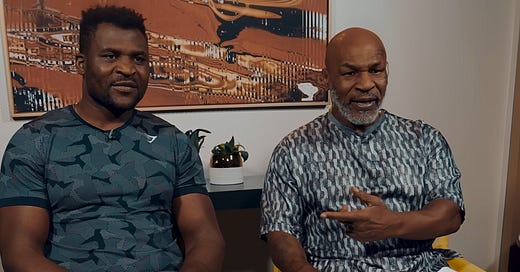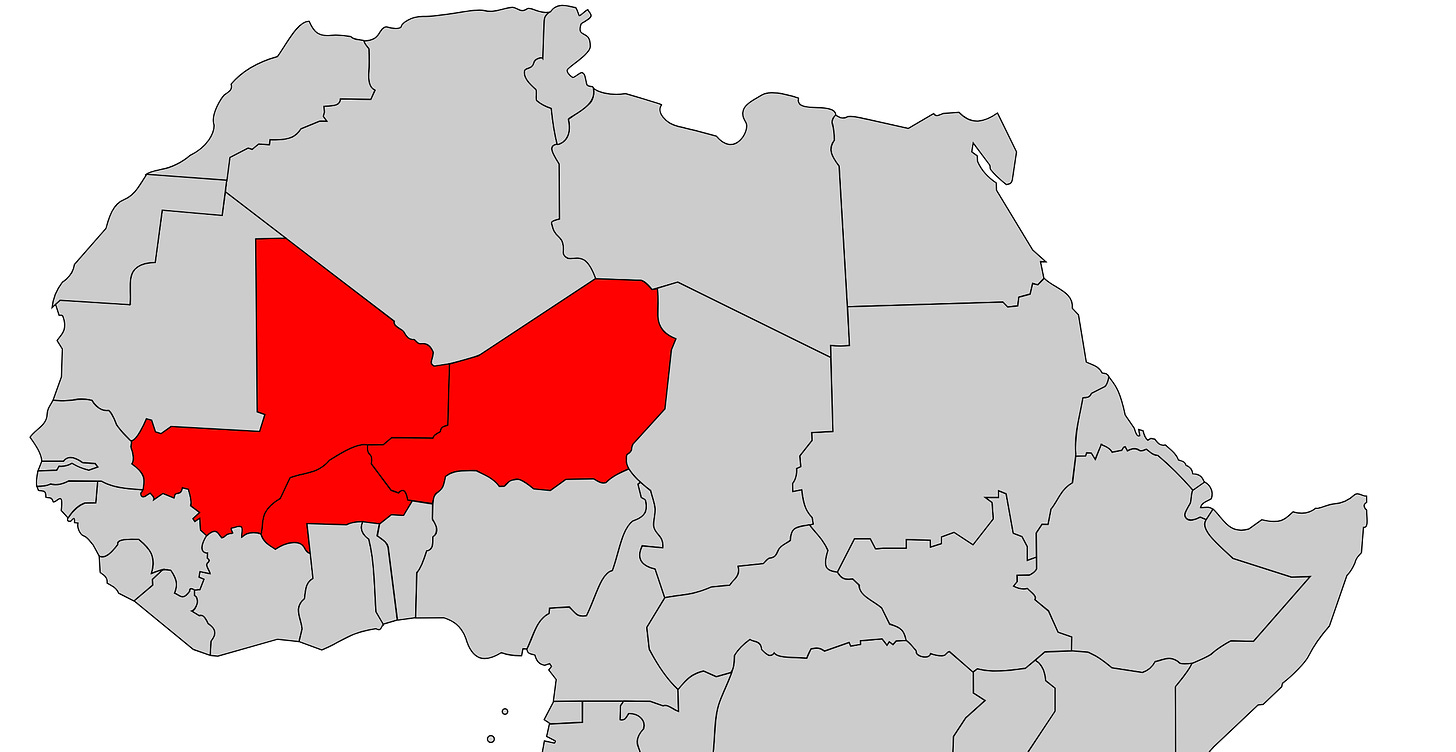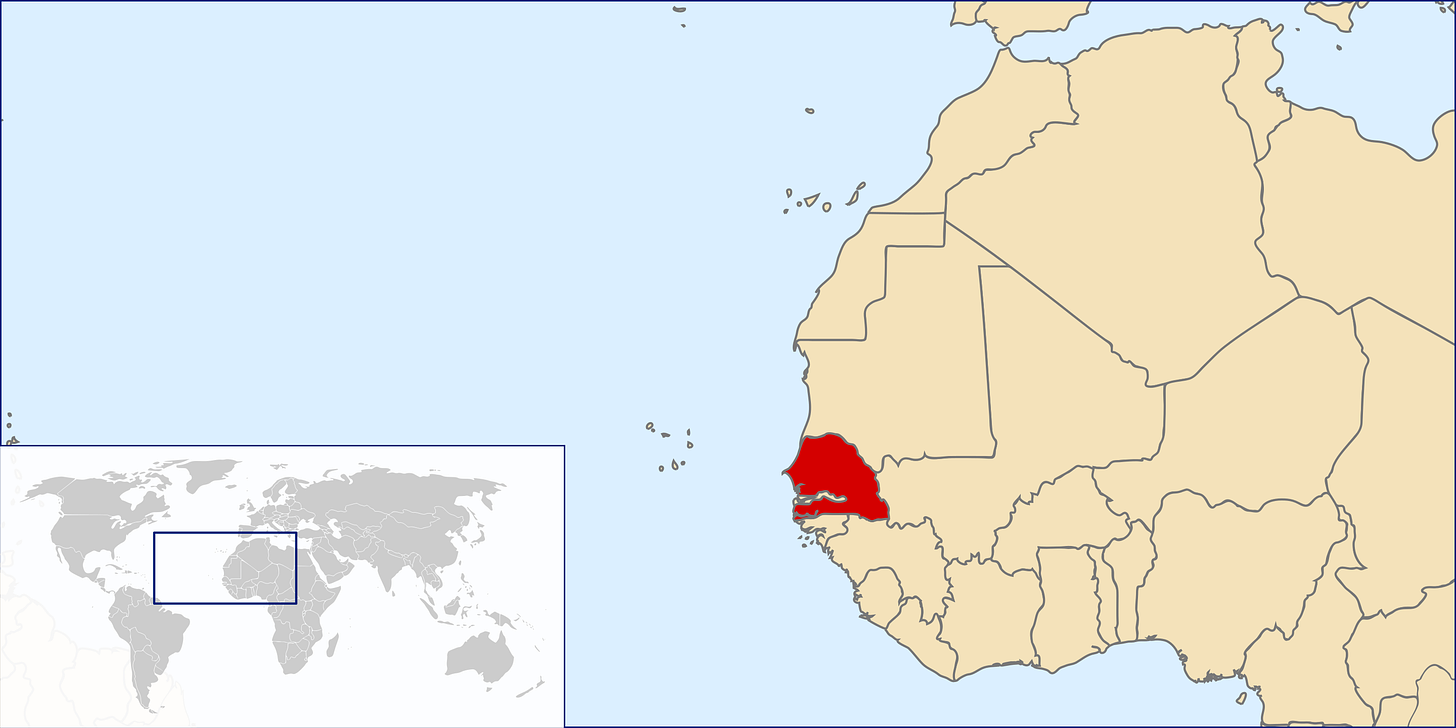🔅 Ngannou's Journey From Sand Mining to Superstardom & Sahel's New Strategic Alliance
Plus, Africa's Digital Wave Hits Brazil & Senegal's Election Countdown
Photo of the Day

Spotlight Stories
From Sand Mines to Saudi Showdown: Francis Ngannou Punches His Way Up to Superstardom
Francis Ngannou, the Cameroonian who once had to rummage for food and sleep in a car park, is set to duke it out with Anthony Joshua in Riyadh tonight. Having transitioned from UFC king to boxing contender, Ngannou's story is the stuff of legend, proving that life can be stranger (and more inspiring) than fiction.
After making waves in his pro boxing debut against Tyson Fury—where he showcased his power by knocking down the WBC world champion—Ngannou is striding into the ring against Joshua with the confidence of someone who’s seen it all. And truly, he has.
Ngannou's tale is one of relentless perseverance. He grew up in incredible hardship in Cameroon, including a stint working in sand mines and being jailed for being an illegal migrant when he made it to Europe.
His pre-fight words resonate with the determination of a man who’s fought life’s most brutal battles outside the ring. Ngannou’s narrative, from toiling in the sand to potentially toppling boxing giants, is a testament to the power of hope and hard work. As he steps into the ring in Riyadh, it’s clear: whether he wins or loses, Francis Ngannou’s story is one for the ages.
The Sahel's Trio of Junta-Led Nations Teams Up
The junta-led trio of Niger, Burkina Faso, and Mali have decided to join forces, creating their own tasked force to combat the increasing security threats across their territories. Niger's armed forces chief, Moussa Salaou Barmou, made the announcement with all the flair of a primetime TV reveal, promising this task force will be ready to rumble "as soon as possible." The details on the size or specific duties of this team are a bit hazy, but the intention is crystal clear.
This alliance, dubbed the Alliance of Sahel States (AES), is the latest sign that these nations are breaking up with their old military BFFs, including France, and starting a new clique. Since taking control in a series of coups from 2020 to 2023, they've seen a spike in violence linked to Islamist groups. In 2023, things got particularly dicey, with conflict fatalities jumping 38% from the year before. Burkina Faso alone reported over 8,000 people killed.
Senegal Gets a New Premiere Date for Elections
Sall has finally set the presidential election for March 24. The announcement came hot on the heels of Sall dissolving the government and swapping out Prime Minister Amadou Ba for Interior Minister Sidiki Kaba. This switcheroo allows Ba, the ruling coalition's presidential hopeful, to hit the campaign trail full throttle.
Earlier, the Constitutional Council refused a proposal for a June 2 vote, declaring it a no-go per the constitution given Sall's term ending on April 2nd. The new election date got a thumbs-up from opposition candidate Anta Babacar and other election hopefuls, who were itching to get the democratic show on the road. The situation had been on tenterhooks the moment Sall attempted to push the original Feb. 25 poll date to December, citing ambiguous electoral squabbles.
To simmer down tensions, Sall also proposed an amnesty law, extending an olive branch to protesters and opposition members tangled in legal nets from past anti-government demonstrations. However, Human Rights Watch threw in a word of caution, highlighting that this amnesty might also sweep under the rug security force excesses, with at least 40 lives claimed in clashes since March 2021.
Digital Diaspora: African Influencers Conquer Brazil's Social Scene

In 2017, Miranda, a dreamer without a smartphone, began showcasing Angola's fascination with Brazil on YouTube. Fast forward five years, and Miranda has become the most-followed Angolan on social media, with 6 million followers. This serves as a testament to the magnetic allure of Brazil's creator economy for Portuguese-speaking African talent. Indeed, Miranda's story symbolizes the burgeoning movement of African influencers making waves in Brazil, drawn by lower data costs and a mammoth audience eager for fresh content.
The contrast is stark between the nascent creator economy in places like Guinea-Bissau and Angola and the flourishing digital marketplace of Brazil. And this cultural exchange, powered by likes, shares, and follows, heralds a new era of digital diaspora. African voices are resonating louder and farther, carving out spaces in Brazil's social media landscape.
Food for Thought
“Where you will sit when you are old shows where you stood in youth."
— Yoruba Proverb






